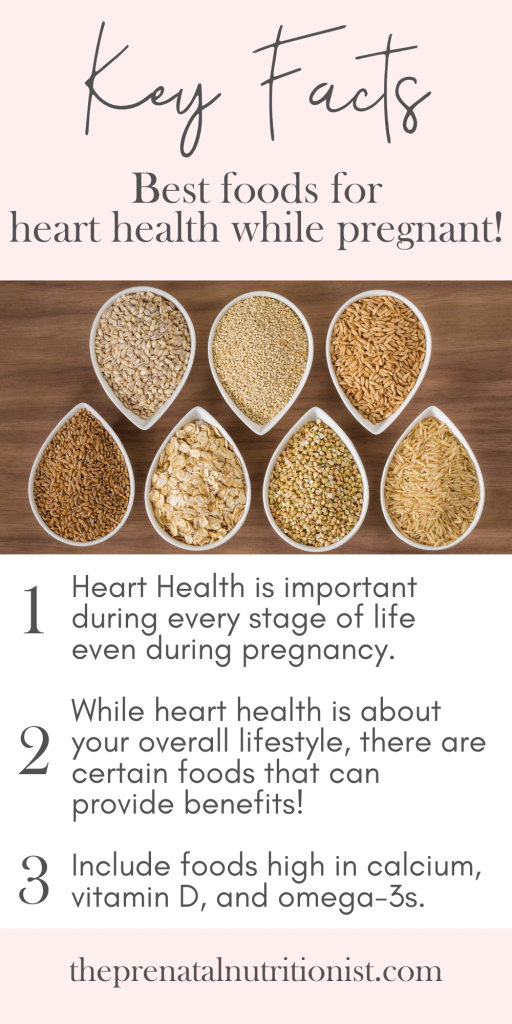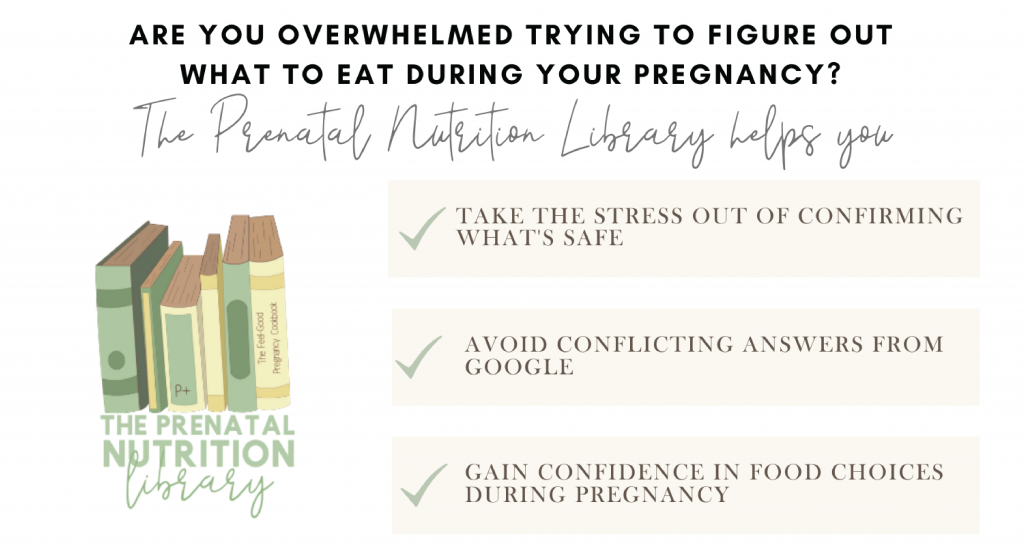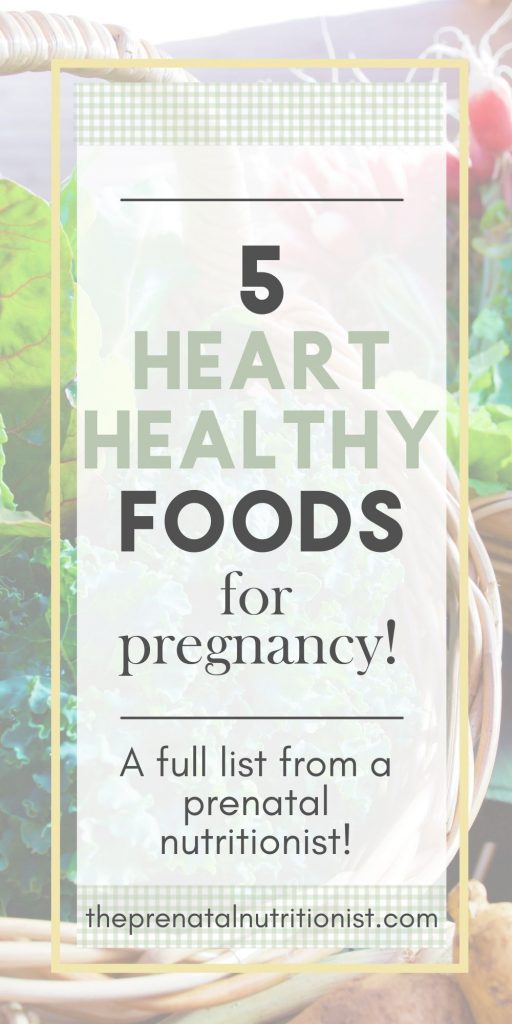
5 Heart Healthy Foods For Pregnancy
Good nutrition is vital for a healthy pregnancy. Making the right food choices helps ensure you get the proper amount of vitamins and minerals you and your baby need.
It is a good idea to give some thought to what you are eating during pregnancy since it affects more than just you! Knowing what foods to eat as part of a healthy pregnancy diet can significantly impact your and your baby’s health now and in the future. This is especially true when it comes to your cardiovascular health.
Cardiovascular disease has increased in prevalence over the last several decades. A heart-healthy lifestyle not only benefits you, but it’s also important for your growing baby too. To promote good heart health for you and your baby, consider adding the following foods to your diet.
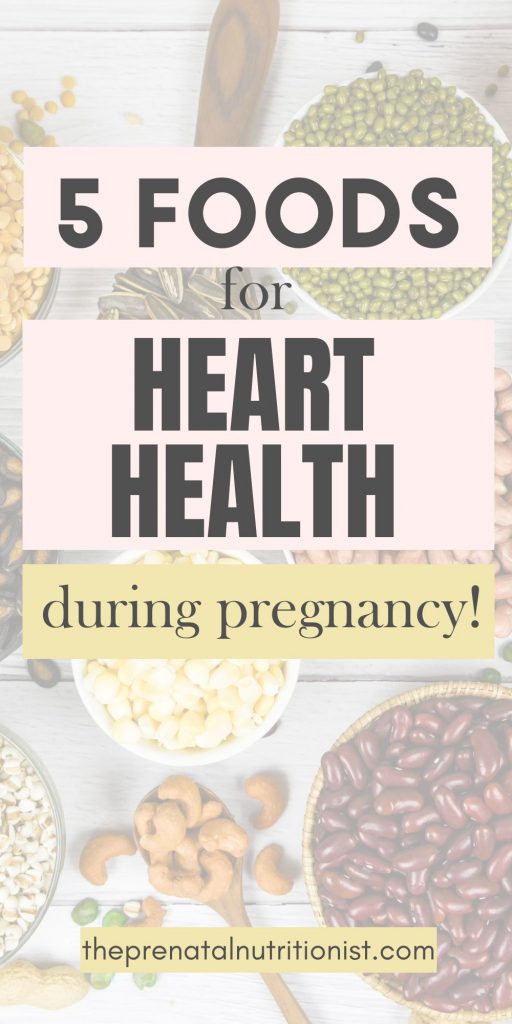
5 Heart Healthy Foods For Pregnancy
Green Leafy Vegetables
Of all the healthy foods on this list, you’ll probably be the least surprised to see vegetables. But there’s no denying their nutritional power. Dark, leafy greens, in particular, contain several essential nutrients for a healthy pregnancy. They include folate, fiber, vitamin K, vitamin C, iron, and magnesium.
Green leafy vegetables like spinach and kale are especially good for heart health because they are each a good source of folate. Folate has been shown to protect the heart and reduce the occurrence of heart-related conditions.
Whole Grains
Carbohydrates are good for more than just supplying your body with energy. They are particularly helpful during the first trimester when intense nausea may strike. But did you also know that fiber-rich carbohydrates like whole grains are also good for your heart?
Carbs tend to get a bad rap regarding nutrition, but the right ones are surprisingly nutritious. Next time you make a sandwich or toast, swap white bread for a whole-grain or a sprouted bread option. You can replace white rice with brown rice or switch to fiber-rich quinoa or wild rice.
Whole grains are excellent sources of dietary fiber, which can help improve your blood cholesterol levels. Plus, they can reduce your risk of stroke, heart disease, obesity, and type 2 diabetes.
Nuts and Beans
Nuts, especially cashews and almonds, and beans (legumes), such as chickpeas and lentils, boost plant-based protein, but they also provide a healthy amount of copper. Copper is a heart-healthy nutrient that is especially beneficial for pregnant women. Many nuts and beans also offer a good amount of healthy fats, essential for good heart health.
If beans aren’t part of your current diet, try adding a little at a time to give your digestive system time to adjust. One or two servings, 2-3 times a week, is a good starting point to avoid gas, bloating, and other digestive issues.
Meat and Seafood
Many kinds of meat and seafood are also incredibly beneficial during pregnancy.
Meat is high in iron, specifically heme iron, which is more easily absorbed than the type of iron found in plants. To get the 27 mg of iron recommended for pregnant women, you’ll want to include a serving of foods like lean ground beef, chicken, turkey, or pork several times per week.
Besides iron, meat is an excellent source of protein, vitamin B12, and many other essential nutrients for pregnancy.
Seafood is another excellent source of protein that is good for your heart. Salmon is especially beneficial during pregnancy. It’s loaded with omega-3 fatty acids, particularly docosahexaenoic acid (DHA), crucial to your baby’s brain development.
Fish and seafood, like salmon, contain beneficial nutrients like selenium and iodine. Salmon and canned skipjack tuna are safe to consume and low mercury fish choices that can be enjoyed 2-3+ times per week while pregnant. Women should aim to eat at least 8-12 ounces of low-mercury fish and seafood per week.
Dairy Products
Dairy products are also an important part of a heart-healthy pregnancy diet. Items like yogurt, milk, cheese, real butter, and ghee provide healthy fats, calcium, protein, vitamin D, and more. All of these options keep you and your baby healthy and strong!
Cottage cheese is also an excellent calcium, protein, and iodine source. There are several ways to eat cottage cheese. If you have difficulty with the texture, you can blend it into a smoothie in place of yogurt.
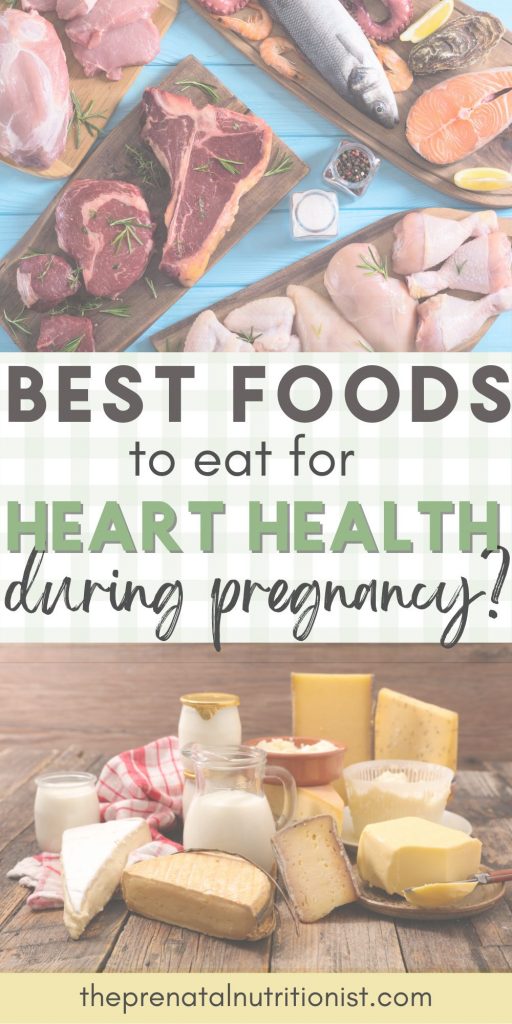
Eat these foods for a stronger, healthier heart – for you and your baby.
Focusing on heart health isn’t only about adding specific heart-healthy foods to your diet. An overall healthful lifestyle that incorporates movement, quality sleep, and stress management is important too. Be sure to talk to your doctor or healthcare provider before drastically changing your diet or exercise routine.
For more ways to promote good health for you and your baby, join The Prenatal Nutrition Library. There’s so much information just waiting to be explored HERE. The Prenatal Nutrition Library is a searchable database, so you will have peace of mind that what you eat during pregnancy is safe and nutritious.
